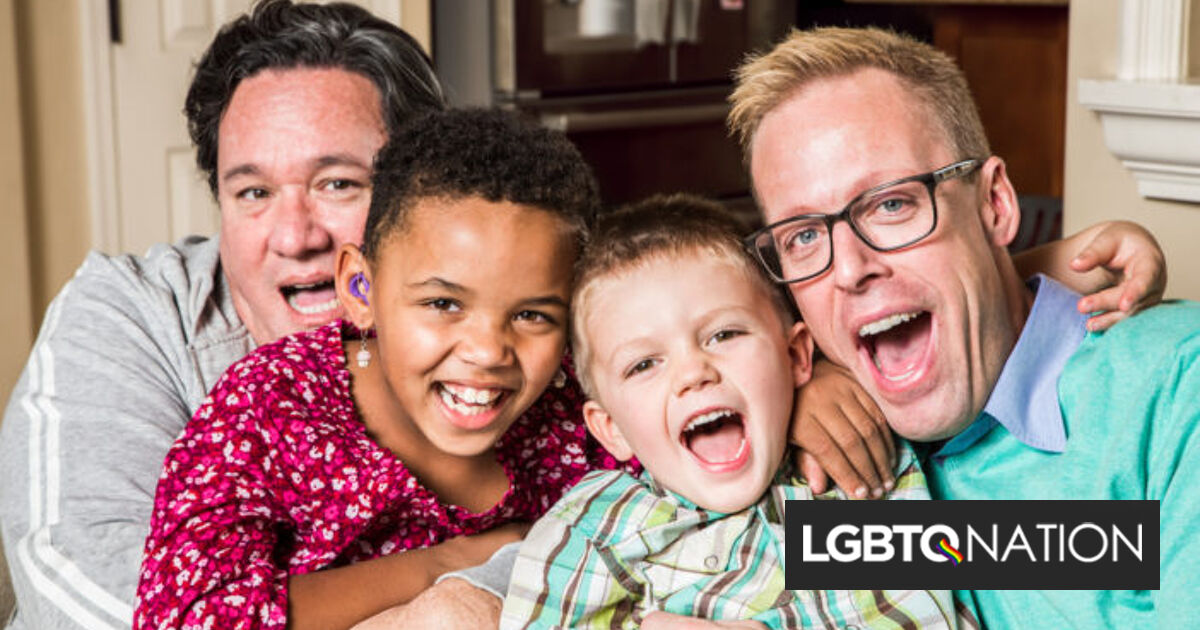Researchers concluded that gay fathers "don’t conform to roles of conventional fathers" making them "highly involved in their children's lives...

www.lgbtqnation.com
More proof that gay men play an integral role is providing homes for the more than 125,000 children awaiting adoption is the US (
Foster care in the U.S. - number of children waiting for adoption 2018 | Statista )
Highlights of the study:
The study looked at a total of 92 fathers as well as their 46 children, each aged between 1 and 6 years of age. The families were all adoptive, and mainly came together using adoption services of the Centre intégré universitaire de santé et de services sociaux (
CIUSSS)
Approximately 1/3 of the children in the care of CIUSS are adopted by gay fathers, which has been legal in Quebec since 2002.
What researchers found were that these parents were highly involved in their children’s lives, with both parents sharing the duties.
Both parents also displayed a wider palette of expression with their children versus straight couples. “They could be playmates, caregivers, protectors, role models, morality guides,” noted Feugé.
View attachment 323044
“What’s really interesting is that they don’t conform to roles of conventional fathers,” added Feugé. “They were able to redefine and propose new models of cultural notions of paternity and masculinity.”
Too bad 99.9 percent of gays do not want kids in the first place which is why they married a man
you have link to back up that wild claim..newbie?
Math does not need a link
Are you claiming that everyone in the gay bar is married and has an adopted child?
There are 65000 children living with a gay parent, 4.5 percent of adults are gay meaning 14805000, 65000 times 2 is 130000 so to be technical after the division .87 percent of all gays have a child.
Math works
Indeed it does..indeed it does...but you claimed..that 99.9% of all gay men who married did not want a child..because they were gay. That has nothing to do with math..and you cannot know just what these gay men desired out of being married ....or that the decision to have..or not to have... a child somehow played into their decision to be married.
You made a sweeping assumption that you have no way of backing up..and thought that some fancy footwork with the calculator would save you...ROTFLMAO!
Also..the current number of Gay men with children has absolutely nothing to do with the unknown number of gay men who may want kids..since you have no way of knowing that figure.
If you are truly new here..know that you have to bring up your game..if you are someone's sock..nice try!
Fact 99.13 percent of gays are childless. Sheesh if they really wanted a child they would have married a member of the opposite sex.
Argue the math all you want because 99.13 percent of gays are childless
By choice by the way
Fact: You are an arrogant ass who has nothing to offer but appeals to ignorance fallacies
Gay people do not have to marry someone of the opposite sex to have children and the fact that they marry the same sex in no way proves that they do not want children. That is just another logical fallacy, a non sequitor
Gay couples come to have children in their care by a variety of means , just like many hetero couples do
Intelligent search from Bing makes it easier to quickly find what you’re looking for and rewards you.

www.bing.com
Thank you. That said I am not picking on gays, however several truths are not deniable.
1. 99.999 percent of humans who want children choose a mate of the opposite sex.
2. 99.16 percent of gays do not have children
3. You want to believe that what 50 percent of gays have kids, well they do not, only 0.84 percent of gays have children.
4. I have not said anything about the parenting abilities of gays, but the mockery that kids get from other kids on parent teacher night is actually sad as kids are unfortunately for the most part very mean, as you well remember
CIAO
Your just making shit up!! You must be living in a place when time stood still around 1970 That is just pathetic
99.16 percent of gay people do not have children. If I was making this up you could prove me wrong. The fact is that you can't and never will precisely because I do not make anything up.
So gay person how many children do you have?
Now is when you make up a number
Yawn
My sexual orientation and my family are none of your fucking business. Did I say that I was gay? The fact that you assume that. based on my advocacy for gays deflates your credibility and my ability to take you seriously even further below zero than it already was, and clearly demonstrates your intellectual limitations which are vast
Left-winger "I know what I'm talking about, and you are wrong!"
Right-winger "really? and how do you live it out?"
Left-winger "My personal life is none of your business!"
It is entirely possible, and even noble, to advocate for the rights of groups of people of which one is not a member. Progressive Patriot's personal life is none of your business.
LOL, why defend gays if you are going to hide in the closet? Furthermore the moment they posted their opinion we are allowed to post our opinions. If you do not accept that then leave
Good fucking God, cut the moronic flaime bating already!
Are you gay or lesbian. I am not here to judge you and if I did it should not matter to you if I did. However if you start a thread about how great gay parents are who expose their children to mockery you should expect that people will assume that you are gay yourself. So are you gay or lesbian
I don't give a fuck what you assume. You're just trying to make this about me in order to avoid dealing with the actual topic and I won't let you. The only one being ex[posed to mockery here is you
I am heterosexual. You refuse to state your sexual preference, I have actually dealt with the topic of how gay parents expose their children to mockery that can lead to mental disorders and suicide
I feel sad that you are ashamed of yourself.
Why not be gay and proud?
Are your parents gay
View attachment 323589
Coming out is a process of understanding, accepting, and valuing your sexual orientation/identity. It involves both exploring your identity and sharing your identity with others. Coming out can be a gradual process or one that is very sudden. The first step usually involves coming out to yourself, often with a realization that feelings you’ve had for some time make sense if you can define them as gay, lesbian, bisexual, transgender or queer.
Coming out can be a very difficult process. Our society strongly enforces codes of behavior regarding sexual orientation and gender identity, and most people receive the message that they must be heterosexual and act according to society’s definition of their gender. For gay, lesbian, and bisexual persons, there may be a sense of being different or of not fitting in to the roles expected of you by your family, friends, workplace or greater society. Coming out involves facing societal responses and attitudes toward LGBTQ people. You may feel ashamed, isolated, and afraid.
Although coming out can be difficult, it can also be a very liberating and freeing process. You may feel like you can finally be authentic and true to who you are. You may find a whole community of people like you and feel supported and inspired. Even if it’s scary to think about coming out to others, sometimes the reward can be worth the challenge that coming out entails.
Individuals do not move through the coming out process at the same speed. The process is very personal. It happens in different ways and occurs at different ages for different people. Some people are aware of their sexual identity at an early age, and others arrive at this awareness after many years. Coming out is a continuing, sometimes lifelong, process.
Once you accept that you’re lesbian, gay, bisexual, transgender or queer, you can decide to be out to others or to stay “in the closet.” You are the only person who can decide when and how it is safe to come out. You may decide to come out in one part of your life and not in another. For example, some people are out to their families but in the closet at work; some people are out at school but in the closet with their families.
Six Stages to Coming Out
The Cass Theory, developed by Vivian Cass (1979) is a six stage model that describes the developmental process individuals go through as they consider and then acquire a homosexual identity. This model includes lesbian, gay and bisexual identities. You may find yourself in one of these stages. Know that what you are experiencing is completely normal and that many, many others have had similar experiences.
- Stage 1 – Identity Confusion: You begin to wonder whether you may be homosexual. Along with other thoughts and feelings, you may experience denial and confusion.
- Stage 2 – Identity Comparison: You accept the possibility that you may be gay and face the social isolation that can occur with this new identity.
- Stage 3 – Identity Tolerance: Your acceptance of your homosexuality increases, and you begin to tolerate this identity. Although confusion and distress concerning your sexual orientation decreases, you may feel increased isolation and alienation as your self-concept becomes increasingly different from society’s expectation of you. In this stage, you often begin to make contact with members of the LGB community.
- Stage 4 – Identity Acceptance: You have resolved most of the questions concerning your sexual identity and have accepted yourself as homosexual. You have increasing contact with the LGB community
- Stage 5 – Identity Pride: You begin to feel pride in being part of the LGB community and immerse yourself into LGB culture. In turn, you have less contact with the heterosexual community. Sometimes you may actually feel angry with or reject the heterosexual community.
- Stage 6 – Identity Synthesis: You integrate your sexual identity with other aspects of your self so that it is just one part of your whole identity. The anger you may have felt toward the heterosexual community or the intense pride you may have felt in being homosexual decreases, and you can be your whole self with others from both groups. You feel more congruence between your public self and your private self.

www.lgbtqnation.com


